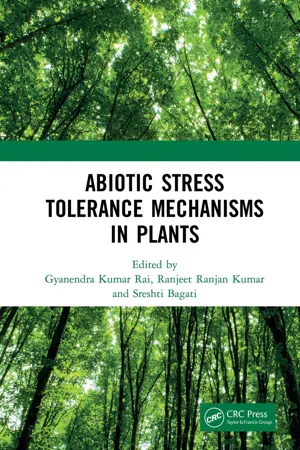
Abiotic Stress Tolerance Mechanisms in Plants
- 356 pages
- English
- ePUB (mobile friendly)
- Available on iOS & Android
Abiotic Stress Tolerance Mechanisms in Plants
About This Book
Since recent years, the population across the globe is increasing expeditiously; hence increasing the agricultural productivity to meet the food demands of the thriving population becomes a challenging task. Abiotic stresses pose as a major threat to agricultural productivity. Having an adequate knowledge and apprehension of the physiology and molecular biology of stress tolerance in plants is a prerequisite for counteracting the adverse effect of such stresses to a wider range. This book deals with the responses and tolerance mechanisms of plants towards various abiotic stresses. The advent of molecular biology and biotechnology has shifted the interest of researchers towards unraveling the genes involved in stress tolerance. More effort is being made to understand and pave ways for developing stress tolerance mechanisms in crop plants. Several technologies including Microarray technology, functional genomics, on gel and off gel proteomic approaches have proved to be of utmost importance by helping the physiologists, molecular biologists and biotechnologists in identifying and exploiting various stress tolerance genes and factors for enhancing stress tolerance in plants. This book would serve as an exemplary source of scientific information pertaining to abiotic stress responses and tolerance mechanisms towards various abiotic stresses.
Note: T&F does not sell or distribute the Hardback in India, Pakistan, Nepal, Bhutan, Bangladesh and Sri Lanka.
Frequently asked questions
Information
Table of contents
- Cover
- Half Title
- Title Page
- Copyright Page
- Contents
- Preface
- 1. Genetic Engineering of Crop Plants for Salinity and Drought Stress Tolerance: Being Closer to the Field
- 2. Biotechnological Approaches for the Development of Heat Stress Tolerance in Crop Plants
- 3. Heat Shock Proteins: Role and Mechanism of Action
- 4. Reactive Oxygen Species Generation, Antioxidants and Regulating Genes in Crops under Abiotic Stress Conditions
- 5. Antioxidant Defense System in Plants against Abiotic Stress
- 6. Heat Stress and its Effects on Plant Growth and Metabolism
- 7. Defense Mechanism in Plants against Abiotic Stresses
- 8. Breeding Approaches to Overcome Abiotic Stress
- 9. Morphological, Physiological, Biochemical and Molecular Responses of Plants to Drought Stress
- 10. Stomatal Activities against Abiotic Stress and Selection of Potential Tolerant Horticultural Crops